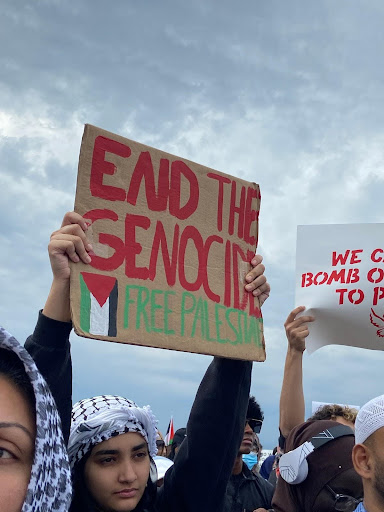‘Amplifying the Voices of Palestinian People is Absolutely Critical’: A Conversation With Catt Knarr

When a group is seen as less than human, others become desensitized even when a genocide is unfolding before their eyes as they scroll through social media. A genocide is exactly what is happening right now in Gaza, and it is vital we speak and show up for Palestinian lives. I recently got an opportunity to speak to Catt Knarr — Communications Director at the U.S. Campaign for Palestinian Rights — about her time in Gaza and how to actively support the Palestinian cause.
Revisiting Gaza and the Stories That Continue to Haunt Its People
“I last visited Palestine in May 2018. I arrived in Palestine only 10 days after the Israeli military shot and killed dozens of Palestinian protesters in Gaza on May 14, 2018 during the Great March of Return. It was my first time in Palestine, and my first time meeting beloved family members there. I visited the West Bank.”
[Read Related: The Political Silence on Palestine]
The Great March of Return is when there was a series of peaceful protests from Palestinians held every Friday in the Gaza Strip from March 30th, 2018 to December 27th 2019. Over 200 Palestinians were brutally murdered by Israeli forces during that time.
“My experience in Palestine was both profoundly moving and deeply painful. I set foot on the native land of my ancestors for the first time, and I felt a deep sense of belonging. I was enthusiastically welcomed and embraced by family members who were meeting me for the first time. I saw my grandfather’s hometown and visited his grave.”
“But I was also reminded of the oppression, trauma, and violence the Israeli regime inflicts on Palestinian people every single day. It was of course not possible to separate my experience in the land from the Israeli military’s killings of Palestinian protesters in Gaza just days before, and like every Palestinian person I carried that with me. I also heard countless stories of how my family and ancestors have endured Israel’s military occupation and violence. I felt a deep rage at all that had been stolen from them and from us.”
How to Be Proactive Instead of Coming off as Performative
“The most important thing to do is to listen to the people who are most directly affected and to respond to their demands and asks. Center their voices first, instead of centering yourself, and then your actions will be genuine and effective. In the case of the ongoing genocide in Gaza, Palestinian people have been constantly asking allies and supporters around the world to take action and to keep talking about what’s happening in Gaza.”
“Posting on social media, and especially amplifying the voices of Palestinian people in Gaza, is absolutely critical because Palestinian voices have been censored in the traditional media at every turn. Even right now, we hear stories of news outlets canceling interviews on Palestinian people in Gaza who are living through genocide. Social media is one of the few spaces where Palestinian voices can be heard and amplified, although of course Palestinian people constantly face censorship on social media platforms as well. That’s why it’s all the more important for allies to support and keep amplifying Palestinian voices. It’s vital to keep talking about Gaza and to keep raising the Palestinian demands for an immediate ceasefire and immediate humanitarian aid entry to Gaza.”

How to Show Support if You’re Unable to Attend a Protest
“I appreciate this question because I know people in my own life who are unable to protest due to chronic illness or disability. My advice is to plug in wherever you can to make an impact with your energy and skills. If you can’t physically be at a protest, you can support in other ways. For example, you can call and email your members of Congress, and then text all your friends and group chats to tell them to do the same. USCPR’s Stop Gaza Genocide toolkit is a great resource for taking a variety of actions, and it includes a message you can text to your friends. This is also a good time to educate yourself on your own government’s complicity. If you live in the U.S., learn about U.S. military funding to Israel and the demand to #StopArmingIsrael. There’s really an unlimited potential for how much you can do on the Internet and by speaking directly to people in your community.”
Safety Precaution for Peaceful Protests
“There are lots of safety resources to best prepare yourself to protest. The Gaza Is Palestine website has a list of resources including legal support and knowing your rights, and there’s also this Amnesty primer on keeping your phone secured. It’s a good idea to set aside some time to explore safety resources and decide which safety precautions make the most sense for you. I personally recommend wearing a mask, which is good precaution for both evading surveillance and for protecting yourself from COVID-19. Make sure you or someone in your group brings snacks and fluids to hydrate. Go with a group, and take action together.”
[Read Related: Gaza and the Power of Social Media]
Now is not the time to remain silent. And as Knarr shares there are many ways you help bring attention to what’s happening in Gaza and show support for Palestinians even if you can’t physically rally for it. As violence in the region continues to escalate, your solidarity is needed more than ever.



